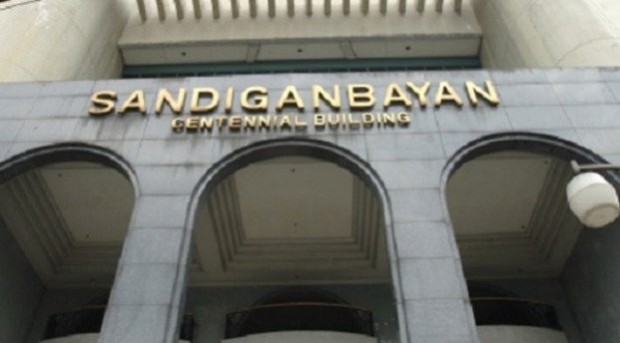The Sandiganbayan has asked to be excused from commenting on a proposed legislation in Congress seeking to prevent the anti-graft court from preventively suspending incumbent officials for offenses committed during the official’s previously held position.
Presiding Justice Amparo Cabotaje Tang has said the Lower House asked the court to comment on Speaker Pantaleon Alvarez’s House Bill 3605, which seeks to amend Section 13 of Republic Act 3019 or the Anti-Graft and Corrupt Practices Act that allows the anti-graft court to preventively suspend incumbent officials charged with a valid information of graft or violation of the Revised Penal Code involving fraud of government funds.
READ: Alvarez bill prevents Sandigan from suspending execs for graft
Tang said it is Congress which has the legislative power to amend the law and even completely repeal the said provision.
“We asked them that we be excused from submitting any comment, because at the end of the day, we will be the one to interpret the law. But since Congress has the plenary power to enact laws, it can do that,” Tang said in an interview with reporters.
“In fact, it can completely amend Section 13 or completely delete it, para wala nang preventive suspension completely (so that there is no more preventive suspension completely). It’s within the legislative power of Congress,” she added.
Tang said the Supreme Court has ruled that the Sandiganbayan can preventively suspend public officials facing graft, but the high court also gave Congress the mandate to discipline its members.
READ: 2 solons now serving suspension, Sandigan told
“Sabi ng Supreme Court, ‘yung sa power to discipline ‘yung members ng each House, (The Supreme Court has said the power to discipline members of each House), that power exclusively belongs to Congress. But the power to suspend with respect to, in connection with criminal cases that are filed with the court, the court has the power to do that, pursuant to Section 13 of Republic Act 3019,” Tang said.
Ombudsman prosecutors have been citing Section 13 in asking the court to suspend pendente lite public officials charged with graft as a matter of course.
The prosecutors said officials charged with graft should be preventively suspended to prevent them from using his or her position to tamper with evidence or intimidate witnesses.
READ: Biazon volunteers to serve suspension
The Section 13 reads: “Any incumbent public officer against whom any criminal prosecution under a valid information under this Act or under Title Seven Book II of the Revised Penal Code or for any offense involving fraud upon government or public funds or property whether as a simple or as complex offense and in whatever stage of execution and mode of participation, is pending in court shall be suspended from office.”
Alvarez’s bill seeks to insert the phrase “provided, that in case such incumbent public officer is no longer connected with the office wherein the offense charged was committed, the preventive suspension order shall no longer be implemented.”
READ: CamSur Rep. Villafuerte agrees to serve suspension pending graft trial
In the explanatory note, the authors said public officials in their new government posts would no longer be in a position to tamper with evidence or intimidate witnesses.
“As preventive suspension is imposed to prevent an accused from influencing potential witnesses or tampering with records, the change in circumstances of the public officer effectively removes this threat, making the provision in line with the spirit and intent of the law,” the authors said.
READ: Pangasinan Rep. Espino serves preventive suspension for graft
The court has been suspending members of Congress facing graft, but both the House and Senate have not implemented the order, leaving it up to the lawmaker to voluntary serve his preventive suspension.
Among the members of the lower House facing graft but who opted to serve the suspension were Muntinlupa Rep. Ruffy Biazon in connection with his pork barrel scam cases, Camarines Sur Rep. Luis Raymund Villafuerte for graft over the allegedly anomalous procurement of P20 million petroleum products and Pangasinan Rep. Amado Espino Jr. for graft over alleged illegal black sand mining.
Senator Joseph Victor “JV” Ejercito also volunteered to serve his suspension, but not long after the anti-graft court granted his demurrer and dismissed his graft case over the allegedly anomalous firearms purchase using calamity funds when he was San Juan city mayor.
READ: JV Ejercito to go on ‘forced vacation’ | Court dismisses graft rap vs JV Ejercito in firearms case
Majority Leader Ilocos Norte Rep. Rudy Fariñas earlier said the Lower House in its history has never implemented suspension orders from the Sandiganbayan because Congress stood pat on its power to discipline its members.
Farinas cited a clash in opinion in the anti-graft law mandating the preventive suspension, and the constitutional mandate of Congress to discipline its own ranks.
According to Article VI, Section 16 of the 1987 Constitution, “Each House may determine the rules of its proceedings, punish its Members for disorderly behavior, and, with the concurrence of two-thirds of all its Members, suspend or expel a Member. A penalty for suspension, when imposed, shall not exceed sixty days.”
“The historical practice is that the House has never implemented the suspension order because it stood pat on its power to suspend its own members,” Farinas then said. RAM/rga
